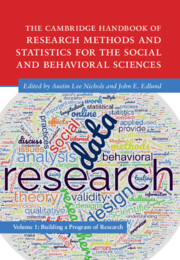 The Cambridge Handbook of Research Methods and Statistics for the Social and Behavioral Sciences
The Cambridge Handbook of Research Methods and Statistics for the Social and Behavioral Sciences from Part I - From Idea to Reality: The Basics of Research
Published online by Cambridge University Press: 25 May 2023
This chapter explores the nature of the work that researchers in the social and behavioral sciences do through a discussion of the ethical principles that ought to guide their work. Since academic researchers have different perceptions and attitudes regarding what constitutes (un)ethical research, we offer an overview of what is considered best practices in social and behavioral science research. This work focuses primarily on the ethical issues related to the design, development, implementation, and publication of research projects. It concludes with a guide for assisting research teams and research ethics committees in assessing the honesty, authenticity, and accountability of their research programs.
To save this book to your Kindle, first ensure [email protected] is added to your Approved Personal Document E-mail List under your Personal Document Settings on the Manage Your Content and Devices page of your Amazon account. Then enter the ‘name’ part of your Kindle email address below. Find out more about saving to your Kindle.
Note you can select to save to either the @free.kindle.com or @kindle.com variations. ‘@free.kindle.com’ emails are free but can only be saved to your device when it is connected to wi-fi. ‘@kindle.com’ emails can be delivered even when you are not connected to wi-fi, but note that service fees apply.
Find out more about the Kindle Personal Document Service.
To save content items to your account, please confirm that you agree to abide by our usage policies. If this is the first time you use this feature, you will be asked to authorise Cambridge Core to connect with your account. Find out more about saving content to Dropbox.
To save content items to your account, please confirm that you agree to abide by our usage policies. If this is the first time you use this feature, you will be asked to authorise Cambridge Core to connect with your account. Find out more about saving content to Google Drive.